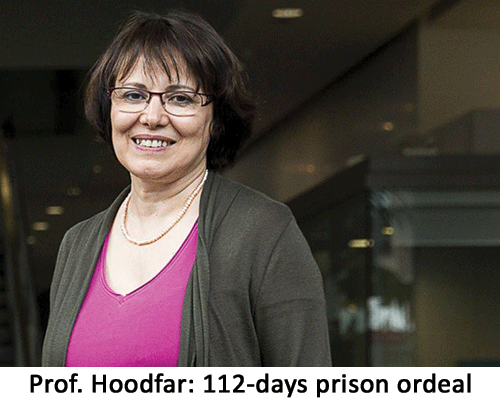 Homa Hoodfar completed her Ph D almost 30 years ago. But it was only earlier last year, when she was locked in a cell in Iran’s Evin Prison — nicknamed Evin University owing to the number of intellectuals imprisoned there — that she first fully understood the value and history of academic freedom. “I don’t remember a single discussion I ever had within academia that explained what academic freedom is and the struggle the academic community had to go through in order to gain that right,” she says.
Homa Hoodfar completed her Ph D almost 30 years ago. But it was only earlier last year, when she was locked in a cell in Iran’s Evin Prison — nicknamed Evin University owing to the number of intellectuals imprisoned there — that she first fully understood the value and history of academic freedom. “I don’t remember a single discussion I ever had within academia that explained what academic freedom is and the struggle the academic community had to go through in order to gain that right,” she says.
But during her 112 days in the notorious Tehran jail, reportedly for “dabbling in feminism and security matters”, Prof. Hoodfar would contemplate the concept, “remembering how many people were burned at the stake for translating the Bible” or were “excommunicated for writing about ideas that other people didn’t accept”.“I took academic freedom for granted,” she says.
The Canadian-Iranian professor of anthropology, based at Concordia University in Montreal, was arrested and imprisoned in Iran on June 6, after almost three months of interrogation by the Iranian intelligence service. Prof. Hoodfar was released on “humanitarian grounds” in September after Canada, which cut diplomatic ties with Iran in 2012, worked closely with officials from Oman, Italy and Switzerland to secure her release. Over 5,000 academics and authors from Latin America to South Korea signed a petition urging the Iranian government to free her unconditionally.
She arrived in Iran in February 2016 to visit family and undertake research in parliamentary archives. But after Iranian conservatives were defeated in the parliamentary elections on February 26 they were looking for people to blame, she says. “Rather than examining why they had lost the support of the public, they started to blame (the result) on the influence of foreigners. They had this theory that foreign states use their dual nationals to influence the election and to bring about a revolution,” she says adding that Iran’s government also sees dual nationals as “pawns” for negotiating with other countries.
At the time of her arrest, Prof. Hoodfar was one of three dual nationals to have been imprisoned in the country during the past year. It didn’t help that five years ago, she co-edited a book Electoral Politics: Making Quotas Work for Women (even though the text did not include a single reference to Iran); and neither did her position on the board of the network Women Living Under Muslim Laws. “Generally, social science research is considered criminal activity in Iran,” she says. “If the result of your research is not what the state (especially non-elected state leaders) like, then you are in trouble.”
Prof. Hoodfar was locked in a cell the size of a double bed. Although there was a window, it was barred with metal, meaning there was no natural light. Bedding consisted of two military blankets, one to roll under her head as a pillow and one to cover the floor. The only other item she was given was a toothbrush.
Now that she is free, Hoodfar plans to write about the anthropology of interrogation. “I feel responsible to write it. I feel like it is part of my contribution to the current debates in Iran and outside Iran on questions of human rights, political rights and also academic rights,” she says. “I feel I owe it to the people who campaigned at such a scale to get me out.”